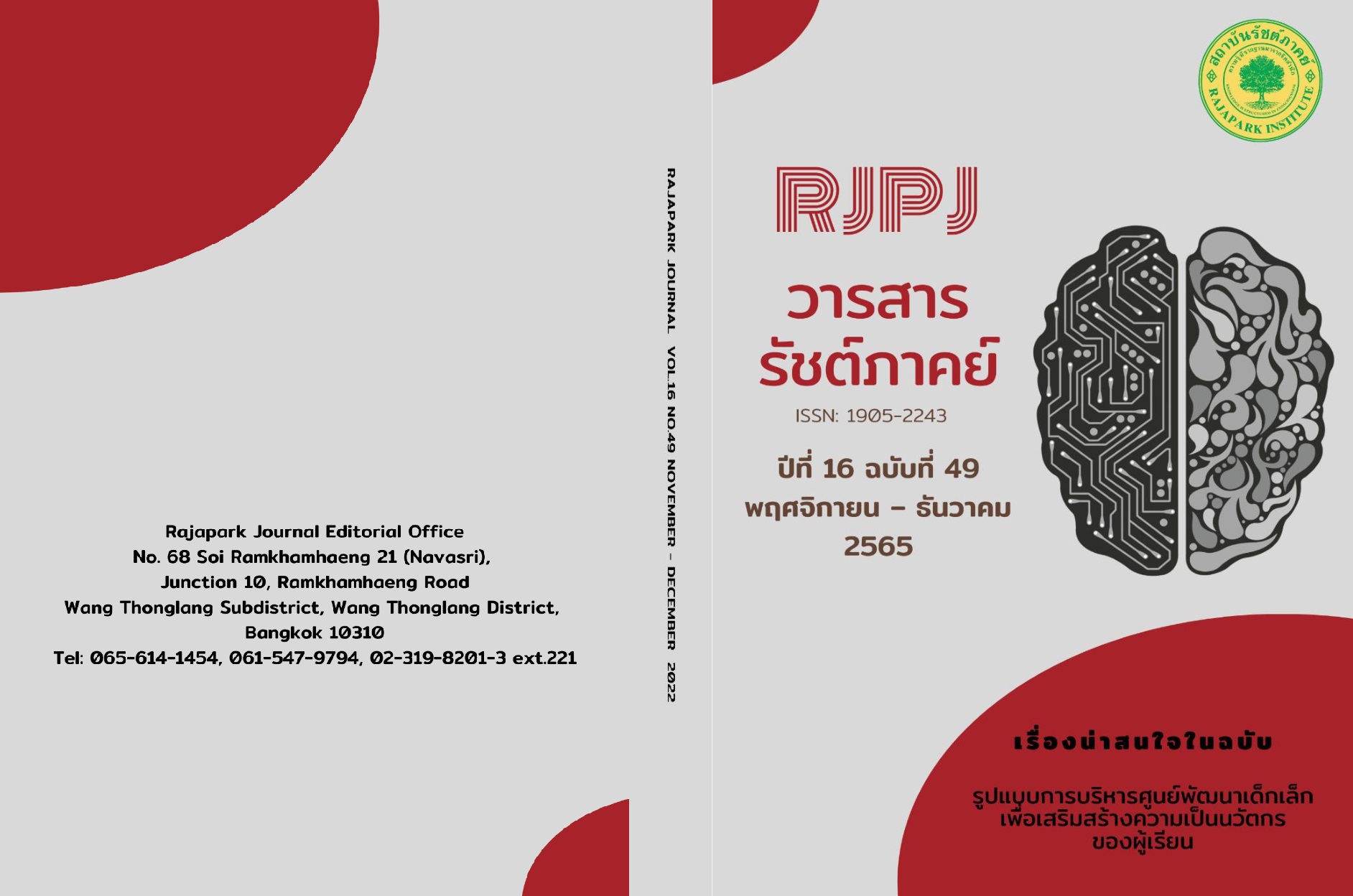Digital Divide and Building the Habit of Reading to the Children in the Developing Countries: Empirical Evidence from PISA Thailand
Main Article Content
Abstract
This article aimed to study the effect of the digital divide caused by educational demand and supply on the probability of developing a reading habit in children. It used the student survey data from the Programme for International Student Assessment, or PISA, in 2018, which included only 8,633 Thai students aged 15 from all schools in all regions of Thailand. The statistics employed for data analysis included a percent frequency distribution and an econometric model. The finding revealed that the digital divide caused by educational demand was having an educational software. The children in the household having it had a higher probability of having a reading habit than the household without it (about 2.80 percent). The digital divide caused by educational supply was having a specific programme to prepare students for responsible internet behaviour. The children in the school with this policy had a higher probability of having a reading habit than the household without it about 8.66 percent.
Article Details

This work is licensed under a Creative Commons Attribution-NonCommercial-NoDerivatives 4.0 International License.
Views and opinions appearing in the Journal it is the responsibility of the author of the article, and does not constitute the view and responsibility of the editorial team.
References
Alderete, M.V., & Formichella, M.M. (2022). Access to ICT at Argentine elementary school children’s homes and its impact on school achievements. Education and Information Technologies, 1-24. DOI: 10.1007/s10639-022-11227-w
Chettri, K. (2013). Reading Habits-An Overview. IOSR Journal of Humanities and Social Science, 14(6), 13-17. https://www.iosrjournals.org/iosr-jhss/papers/Vol14-issue6/C01461317.pdf
De Naeghel, J., Van Keer, H., Vansteenkiste, M., & Rosseel, Y. (2012). The Relation Between Elementary Students' Recreational and Academic Reading Motivation, Reading Frequency, Engagement, and Comprehension: A Self-Determination Theory Perspective. Journal of Educational Psychology, 104(4), 1006-1021. DOI:10.1037/a0027800
Ebadi, S., & Ashrafabadi, F. (2022). An exploration into the impact of augmented reality on EFL learners’ Reading comprehension. Education and Information Technologies, 27(7), 9745–9765. DOI: 10.1007/s10639-022-11021-8
Fasih, T. (2008). Linking Education Policy to Labor Market Outcomes. The World Bank.
Khaola, P. P., Musiiwa, D., & Rambe, P. (2022). The influence of social media usage and student citizenship behaviour on academic performance. The International Journal of Management Education, 20(2), 100625. https://doi.org/10.1016/j.ijme.2022.100625
Lindsay J. (2010). Children’s access to print materials and education-related outcomes: Findings from a meta-analytic review. Learning Point Associates.
National Statistical Office. (2021). The 2020 Household Survey on the Use of Information and Communication Technology.
http://www.nso.go.th/sites/2014/Pages/home.aspx/.
PISA. (2019). PISA 2018 Results (Volume II): Where All Students Can Succeed. OECDiLibrary. https://doi.org/10.1787/19963777
Pholphirul, P. (2015). Economics of Teacher. P.A. LIVING.
Broekman, F., Smeets, R., Bouwers, E., & Piotrowski, J. (2021). Exploring the summer slide in the Netherlands. International Journal of Educational Research, 107, 101746. https://doi.org/10.1016/j.ijer.2021.101746
Strommen, L.T., & Mates, B. F. (2004). Learning to love reading: Interviews with older children and teens. Journal of Adolescent and Adult Literacy, 48(3), 188–200. https://doi.org/10.1598/JAAL.48.3.1
Sunday, O.J., Adesope, O.O., & Maarhuis, P.L. (2021). The effects of smartphone addiction on learning: A meta-analysis. Computers in Human Behavior Reports, 4, 100114. https://doi.org/10.1016/j.chbr.2021.100114
Vuong, Q.H., La, V.P., Nguyen, T.H.T., Nguyen, M.H., Vuong, T.T., Vuong, H.M., & Ho, M.T. (2021). Impacts of parents and reading promotion on creating a reading culture: Evidence from a developing context. Children and Youth Services Review, 131(C), 106311. DOI: 10.1016/j.childyouth.2021.106311
Wainer, J., Vieira, P., & Melguizo, T. (2015). The association between having access to computers and Internet and educational achievement for primary students in Brazil. Computers & Education, 80, 68-76. DOI:10.1016/j.compedu.2014.08.007
Wedel, K. (2021). Instruction time and student achievement: The moderating role of teacher qualifications. Economics of Education Review, 85, 102183. https://doi.org/10.1016/j.econedurev.2021.102183
Zheng, L., Bhagat, K.K., Zhen, Y., & Zhang, X. (2020). The effectiveness of the flipped classroom on students’ learning achievement and learning motivation. Journal of Educational Technology & Society, 23(1), 1-15. https://www.jstor.org/stable/26915403


